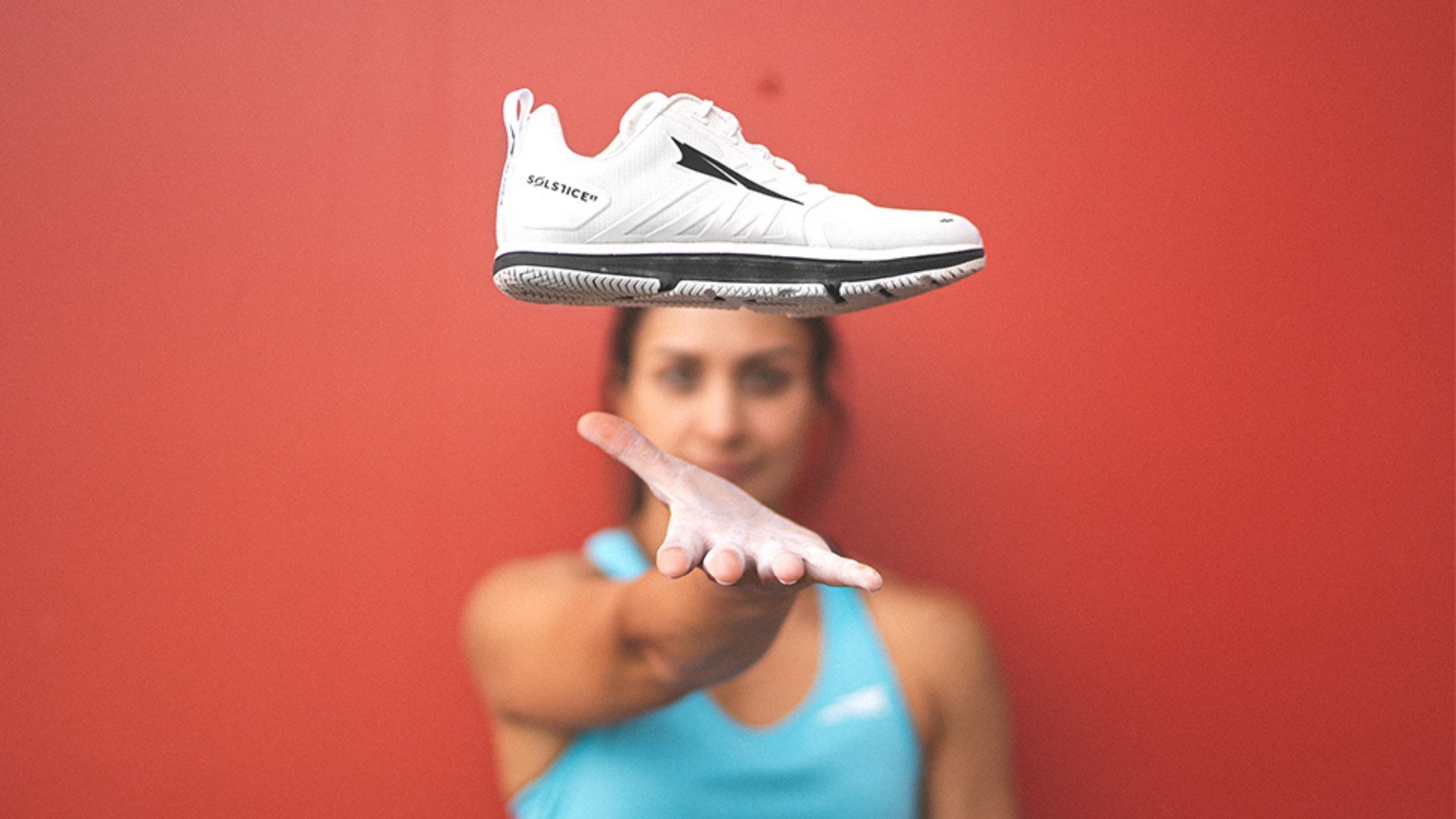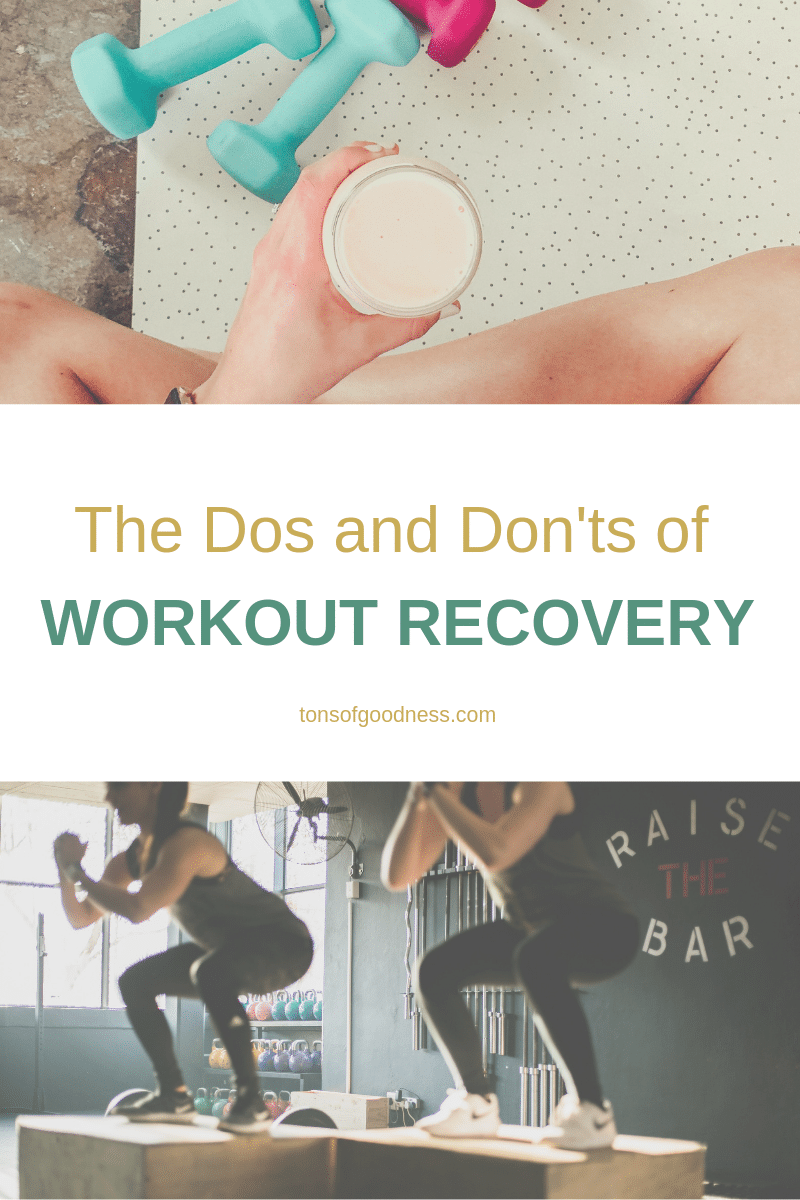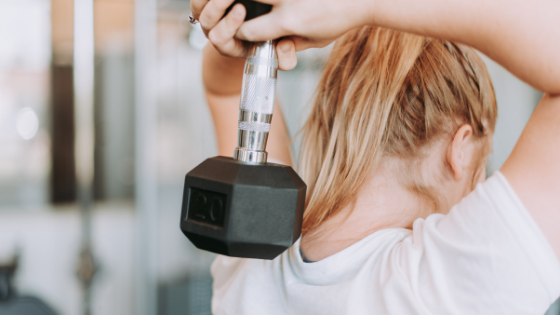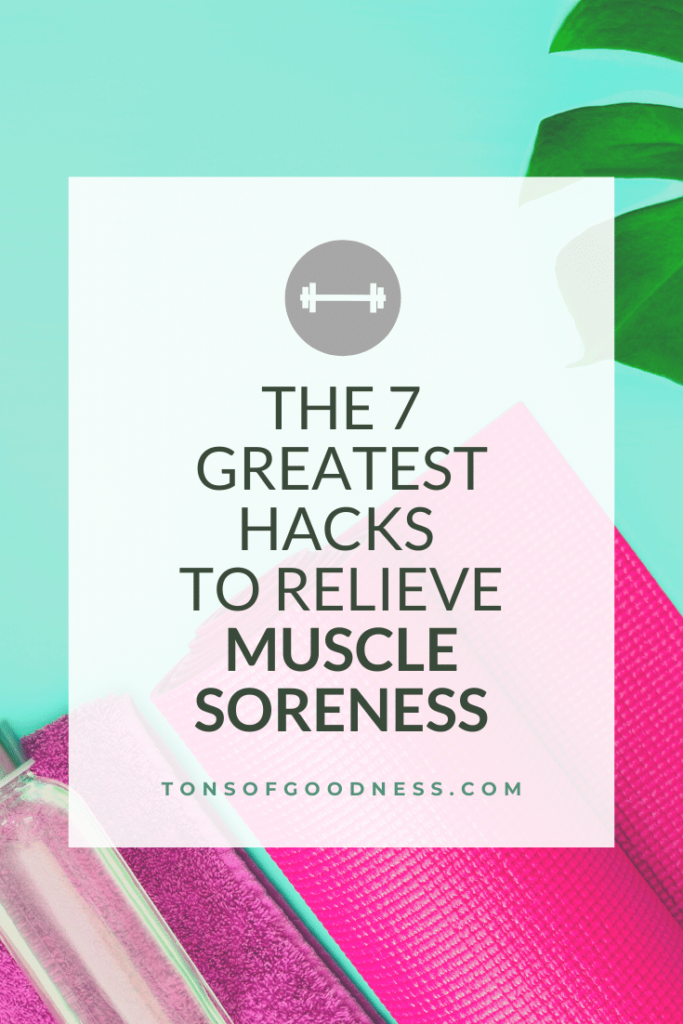

Disclosure: Some of the links in this article are affiliate links, which means that if you purchase through those links I will receive a small commission. For example, as Amazon Associate, I earn from qualifying purchases. If you decide to use these links, thank you!
Recovery to relieve muscle soreness is an essential part of any workout routine. Recovery may not be as exciting as your workouts, but what you do post-workout can have a huge impact on your overall fitness, progress, and results.
Put simply, your muscles can only do so much for you, especially if you don’t allow them to recover and give them what they need to perform.
I began researching workout recovery because I feel somewhat sore or achy on most days. My typical workout routine is lifting weights four days a week and completing either a HIIT workout or run two days a week.
Don’t get me wrong, feeling sore or achy after a workout helps me to feel like my workout is “working”. But, I felt like I could do more to help my body recover from workouts.

Muscle soreness is definitely a sign of the muscle growth process. Ultimately, the stress/recovery/adaptation cycle explains how training makes us stronger over time. When you exercise, you create stress to your body that causes microscopic damage to your muscles. There is an inflammatory response that is the first step toward repairing the damage. Then, through rest, we recover.
This adaption process after the
You get stronger during the recovery and adaptation phases of the cycle. It’s during this period that your body starts repairing muscles and tissues, thus making them stronger than they were before, and ready to handle another round of stress. This applies to all types of exercise. Our bones, muscles, tendons, heart, and lungs, will adapt to the stress appl
The technical term for post-exercise soreness is
You lose a lot of fluid during exercise and ideally, you should be replacing it during exercise. Drinking water after exercise is an easy way to boost your workout recovery. Water supports every metabolic function and nutrient transfer in the body and having plenty of water will improve every bodily function.
Drinking fluids also helps flush out waste products. When muscles break down, they release waste products and toxins that need to be filtered out of the body. These
It’s also a good idea to drink an electrolyte supplement as part of your workout recovery
Stretching is a simple and fast way to help your muscles recover. It can reduce muscle fatigue as well as help your muscles to recover faster after working out. Stretching is also a great way to improve flexibility and range of motion. Focus on major muscle groups as well as anything that is feeling especially sore or achy.
If you have a foam roller, it would also be beneficial to roll out on the foam roller to alleviate any knots and tightness. I love the Gaiam Restore Foam Roller with Self-Guided Exercise Illustrations.
Eating high-quality protein, complex carbohydrates, and healthy fats can help your body to recover and repair after a workout.
Protein delivers essential amino acids that are used to rebuild muscle and tissue after strenuous exercise. Eating protein after exercise stimulates
Check out this post for a list of the best dairy-free protein powders: The 9 Best Vegan Protein Powders You Will Absolutely Love
Studies have shown that ingesting 20–40 grams of protein seems to maximize the body’s ability to recover post-workout.

In addition, you want to make sure that you are eating protein throughout the day to meet your protein needs. A meta-analysis of 49 studies indicates that a simple number to aim
In addition, your body’s glycogen stores are used as fuel during exercise, and consuming carbs after your workout helps replenish them. The rate at which your glycogen stores are used depends on the activity. For example, endurance sports cause your body to use more glycogen than resistance training. For this reason, if you participate in endurance sports (running, swimming, etc.), you might need to eat more carbs than if you are lifting weights.
Healthy fats, such as Omega-3’s, are also beneficial because they are anti-inflammatory foods. These are found in foods like wild-caught salmon, chia seeds, flaxseeds, walnuts, and
Ideally, research from the International Society of Sports Nutrition indicates that you should try to eat within 60 minutes of the end of your workout. Yet, the best way to make sure that you are getting the nutrition you need is to eat protein, carbs, and healthy fats at each meal.
My go-to
Magnesium should be part of every athlete’s recovery process. It is an essential building block for hundreds of chemical processes in the body.
Magnesium is important for workout recovery supplement because it regulates heart rhythm, allows muscles to contract and relax properly, reduces cramps, reduces blood pressure, and is necessary to produce ATP (the main source of energy in our cells) which must be bound to a magnesium ion in order to be biologically active.
I take a magnesium supplement each night before bed. It helps me relax and relieves leg discomfort and muscle soreness, which improves my quality of sleep.
If I am especially sore I use magnesium oil, which is more rapidly absorbed into your body. Just make sure to use a high quality magnesium oil like Ancient Minerals. They also make magnesium flakes for a relaxing bath.
Vitamin C, also called ascorbic acid or L-ascorbate is also an important vitamin that your body needs to function properly. It’s necessary for tissue growth and healing the body. In addition, it is an antioxidant, meaning that it helps to protect your cells, strengthen the immune system, and fight off disease. Vitamin C has also been proven to decrease muscle soreness.
Vitamin C also aids in collagen formation. Since collagen is the primary component of connective tissue, vitamin C becomes an essential part
You can find vitamin C in fruits like oranges, limes, lemons, bananas, pineapples and in vegetables like red, yellow and green peppers, broccoli, tomatoes, and more. You could also choose to take a workout recovery supplement to ensure you’re getting enough Vitamin C.
Get your sleep! While you sleep, amazing things are taking place in your body. Therefore, great sleep is essential for anyone who exercises regularly. During sleep, your body produces Growth Hormone (GH) which is largely responsible for tissue growth and repair.
Most studies show somewhere between 7-9 hours of sleep per night is ideal.
Consistently getting inadequate sleep can result in subtle changes in hormone levels, particularly those related to stress, muscle recovery, and mood. Other studies link sleep deprivation with decreased aerobic endurance and increased ratings of perceived exertion.

Some ideas that may help you to get more sleep include: Stick to a sleep schedule of the same bedtime and wake up time, even
Time is one of the best ways to recover from a workout. Resting allows the repair and recovery process to happen at a natural pace.
You may feel lazy or guilty about taking a day off. Like I said though, the body repairs and strengthens itself in the time between workouts, so taking a rest day is nothing to feel guilty about. On your rest days, you could also choose easy, gentle movements like walking or yoga. This improves circulation, which helps muscles repair faster.
You may be tempted to take pain medication (aspirin or NSAIDs) if you are sore after a workout. However, research has shown that pain medication does not increase the rate of recovery from exercise (source). Even worse, pain medication has been found to reduce new muscle protein synthesis after intense exercise and reduce muscle growth after intense exercise (source).
Creatine is one of the most popular supplements for muscle growth for men, however, the research shows that this supplement has little to no benefit for women for muscle development and endurance (source, source). It also sometimes has adverse side effects (anxiety, stomach upset, weight gain). So, I would avoid this supplement.
An important part of recovery is listening to your body. If you are feeling fatigued or are extremely sore then you may need more workout recovery time. If you pay attention, in most cases, your body will let you know what it needs, when it needs it. The problem for many of us is that we don’t listen to those warnings or we dismiss them. Please don’t ignore your body!
A lot of women I hear from say that they workout and then attempt to skip meals and cut calories. I
If you are still experiencing muscle soreness after trying these tips, then you may benefit from using an acupressure mat. When using an acupressure mat, thousands of spikes apply pressure to skin and muscles, supporting circulation, relaxation, mental clarity, and overall well-being. Using an acupressure mat is a natural form of pain relief (source). It can also improve sleep and increase energy levels. I use the Nayoya Acupressure Mat and Pillow Set for 20 minutes at a time as needed.

I hope these workout recovery tips are helpful to you! Please share the goodness and click on an image to pin or share on Instagram and Facebook and hashtag it #tonsofgoodness. Thank you!
Wishing you tons of goodness in your life,
Kat


*Please note that the information in this blog post should not be used to diagnose, treat, prevent or cure any disease or condition. This information is not a substitute for medical advice from your health care professional. For more details see my medical disclaimer here.